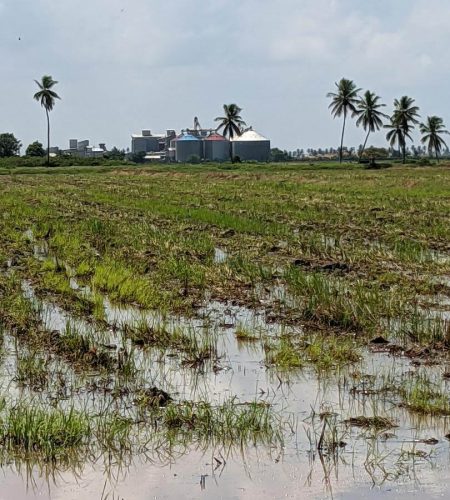Earlier industry predictions that this year’s May/June rains were likely to result in a shortfall in rice yield are well on the way to being realized, according to sources with intimate knowledge of the sector.
Stabroek Business has been informed of erratic buying patterns and in some instances significant price hikes as buyers resort to unfamiliar markets in order to come as close as possible to meeting their purchasing targets.
Earlier in the year, Nand Persaud & Company Chief Executive Officer Mohindra Persaud had told the Stabroek Business, based on assessments of the impact of the rains on rice planting, that there was almost certain to be a fairly significant reduction in rice yield. When Stabroek Business spoke with Persaud earlier this week he said that up to that time his company had only been able to secure 60% of its anticipated purchases. He noted that while there was still some paddy “trickling into the company” from farmers who had earlier delayed planting on account of the rains, those amounts were unlikely to completely “make up” for the expected 40% shortfall.
Persaud, however, was quick to state that in a circumstance such as this his company would be giving priority, first, to the local market and afterwards, to the regional market.

Further, Nand Persaud & Company is not yet ready to close the door on further paddy supplies coming into the company for milling. He explained that shortfalls in paddy production from the previous crop had meant that the company had to resort to farmers in Essequibo in order to help make up the paddy shortfall from the company’s traditional suppliers. He also said that the company will have to resort to Essequibo suppliers again in order to, as far as possible, make up the current paddy supply shortfall.
Meanwhile, Chief Executive Officer of the Affiance, Essequibo-based rice millers Imam Bacchus & Sons, Adil Baksh, told Stabroek Business on Monday that he had been successful in acquiring his own relatively modest quantity of paddy from farmers on the coast which will be milled to meet Essequibo market demand. The Essequibo miller also confirmed that buyers from outside of Region Two had made their presence felt in the region, an indication that the weather-related paddy shortage was impacting supplies elsewhere in the country. Baksh also confirmed that this year’s May-June rains had impacted on overall paddy yield in Region Two.
Smaller rice farmers on the Essequibo Coast also shared their recent weather-related experiences with the Stabroek Business. Sixty-six-year-old Jailall Sundar of Paradise, Essequibo Coast said that up to this time he has only harvested four acres from the nine-acre spread he cultivates. He anticipated that what he has harvested so far will yield 161 bags of paddy, but that his returns had been reduced on account of having incurred costs ($400 per bag) in order to transport his paddy to the mill. The cost of transportation is a result of the deplorable state of the dam. Additionally, he told this newspaper that while he was pleased with the recent increase in paddy prices, his earnings had to be ploughed back into defraying expenses associated with his May-June cultivation operations. Harvesting of the remaining five acres of paddy has, Sundar said, been slowed down on account of the state of the access dam.
Lima rice farmer Hardat Narine had a similar story. He, too, experienced a shortfall in paddy yield on account of this year’s inclement weather. For the last crop, his yield slipped by almost 100 bags, from 371 bags to 284 bags of paddy.
Reliance, Essequibo farmer Naith Ram also reported a shortfall in yield; it slipped from 37 bags per acre to 27 bags per acre.
Persaud told Stabroek Business earlier this week that he expected that planting for the forthcoming crop will begin in the new week.
When Stabroek Business visited the Essequibo Coast earlier this week, we found farmers there engrossed in various stages of preparation for the planting of the next crop which is expected to commence this month.





